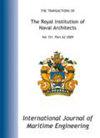斜流中推拉吊舱推进器水动力特性的预测方法
IF 0.6
4区 工程技术
Q4 ENGINEERING, MARINE
引用次数: 0
摘要
本文介绍了一个基于数值模拟的研究程序的结果,该程序用于评估在开放水域中操作时,拉式和推式吊舱推进器在直线和静态方位角条件下的推进特性。介绍了在多种方位角条件和吊舱配置下,使用雷诺平均Navier-Stokes(RANS)求解器预测螺旋桨推力和扭矩以及吊舱力和力矩的三维方法。为了深入了解结果的可靠性和准确性,对直进条件下的吊舱推进器进行了网格和时间步长相关性研究。模拟技术和结果首先根据裸螺旋桨和吊舱推进器在多个装载场景下以及在牵引器和推进器配置下的直行条件下的测量值进行了验证。接下来,进行了模拟,以在多种载荷条件下,在+30°至-30°的不同方位角(增量为15°),对两种配置的吊舱式推进器进行建模。大多数模拟都是使用稳态和非稳态条件进行的,主要是为了评估设置条件对计算时间和预测精度的影响。在所研究的所有载荷条件、方位角和吊舱配置下,使用非定常RANS方法预测的吊舱单元的性能特性在相应实验测量值的1%至5%范围内。在预测结果中,吊舱单元的性能系数在各种载荷和方位角条件下的非线性行为被很好地捕捉到。该研究表明,RANS求解器具有适当的网格布置、边界条件和设置技术,可以预测吊舱推进器在多个方位角、吊舱配置和各种载荷条件下的性能特征,其精度与实验结果相同。此外,还讨论了由RANS预测得出的吊舱支柱-螺旋桨机身上和周围的速度和压力分布。本文章由计算机程序翻译,如有差异,请以英文原文为准。
METHODOLOGIES TO PREDICT HYDRODYNAMIC CHARACTERISTICS OF PUSHER AND PULLER PODDED PROPULSORS IN OBLIQUE FLOWS
This paper presents the outcome of a numerical simulation based research program to evaluate the propulsive characteristics of puller and pusher podded propulsors in a straight course and at static azimuthing conditions while operating in open water. Methodologies to predict the propeller thrust and torque, and pod forces and moments in three dimensions using a Reynolds-Averaged Navier Stokes (RANS) solver at multiple azimuthing conditions and pod configurations are presented. To obtain insight into the reliability and accuracy of the results, grid and time step dependency studies are conducted for a podded propulsor in straight-ahead condition. The simulation techniques and results are first validated against measurements of a bare propeller and a podded propulsor in straight ahead condition for multiple loading scenarios and in both puller and pusher configurations. Next, simulations were carried out to model the podded propulsors in the two configurations at multiple loading conditions and at various azimuthing angles from +30° to –30° in 15° increments. The majority of the simulations are carried out using both steady state and unsteady state conditions, primarily to evaluate the effect of setup conditions on the computation time and prediction accuracy. The predicted performance characteristics of the pod unit using the unsteady RANS method were within 1% to 5% of the corresponding experimental measurements for all the loading conditions, azimuthing angles and pod configurations studied. The non-linear behaviour of the performance coefficients of the pod unit are well captured at various loading and azimuthing conditions in the predicted results. This study demonstrates that the RANS solver, with proper meshing arrangement, boundary conditions and setup techniques can predict the performance characteristics of the podded propulsor in multiple azimuthing angles, pod configurations and in the various loading conditions with a same level of accuracy as experimental results. Additionally, the velocity and pressure distributions on and around the pod-strut- propeller bodies are discussed as derived from the RANS predictions.
求助全文
通过发布文献求助,成功后即可免费获取论文全文。
去求助
来源期刊

International Journal of Maritime Engineering
ENGINEERING, MARINE-
CiteScore
1.20
自引率
0.00%
发文量
18
审稿时长
>12 weeks
期刊介绍:
The International Journal of Maritime Engineering (IJME) provides a forum for the reporting and discussion on technical and scientific issues associated with the design and construction of commercial marine vessels . Contributions in the form of papers and notes, together with discussion on published papers are welcomed.
 求助内容:
求助内容: 应助结果提醒方式:
应助结果提醒方式:


